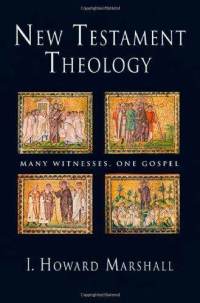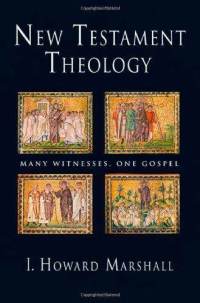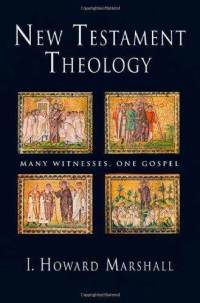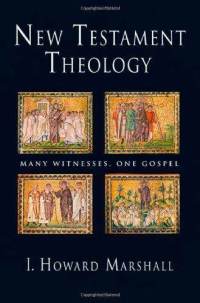 Image courtesty of www.GdeFon.ru Image courtesty of www.GdeFon.ru The Meaning of the Term Kingdom (κόσμος) in John's Gospel A Greek word study to identify the lexical range and usage to better understand what John, and by extension Jesus, had in mind when he spoke about the "World."
1 Comment
 I. Howard Marshall's chapter on John in terms of Dogmas, Doctrines, Distinctives, and Details.* Dogmas. In John, Marshall rightly recognizes Jesus' claim to preexist Abraham and sees support for Christ claiming “parity with God,” but his insistence feels lacking in some areas (502). He accurately captures the main theme as Jesus is the Messiah and Son of God “who came into the world to bear witness to the truth and to give his life so that all people might have the opportunity of receiving eternal life through faith in him” (512). From here, Marshall wonderfully describes seven principal points that impact Christology, being the Logos's: 1) divine eternal nature, 2) responsibility for creation, 3) bringer of light (salvation), 4) rejection by the world, 5) human nature, 6) witnessed by disciples, and 7) the mediator of full blessing (492-493). These are summed up in Christ's role and status, where he is: God's sent one (implying that it is God's will and purpose to save the world), and the founder of salvation (not the “Revealer” so Bultmann or “mythological divine figure” so Ernst Kasemann) (512). The Bultmannian school is cast as only “superficially plausible” and “breaks down under closer inspection” since Salvation goes much deeper, being a “life in relationship with God” (520). This demands that “faith is not only an intellectual acceptance of the message, but also a total commitment of the person to Jesus and to God” since faith is a continuing relationship and not an aorist event (521). The Great Commission is impossible, but Jesus gave a phenomenal promise that the Church can succeed: "Behold, I am with you always, to the end of the age" (Matthew 28:20), Christ's perpetual presence. There are three implications of Christ's perpetual presence that allow us to proceed with the Great Commission with confidence: 1. Commission Impossible – we need help 2. Divine Supervision – we are not abandoned 3. Mission Accomplished – there is an end Stylistic question: some people love audience involvement (aka. "repeat after me" or "turn to your neighbor and say..." etc.) and some people hate audience involvement. Is there a right way to do it? Should it be done at all?
Overview:
An analysis of Christ's Mission in Matthew 16:13-28 will help Christians to examine what influences their theology. There is too much in this passage to cover in 20 minutes, so a narrow focus is drawn from the parallel situation in Christ's day about maintaining a proper perspective and putting priorities straight in light of the Mission of God and the politics of the day. Christians need to ensure that political stances and agendas are the direct result of biblical principles in light of Christ's Mission and not culturally conditioned preconceptions supported with a smattering of proof-texts lifted from random parts of the bible. Preached on election day, 11-06-12.  I. Howard Marshall's chapter of Luke in terms of Dogmas, Doctrines, Distinctives, and Details.* Dogmas. Marshall affirms all dogmas key to being “Christian.” The gospel of Christ is central, with repentance and lifelong discipleship to the Trinity as revealed in scripture. He shows that Jesus gave two options: to be or not to be His disciple, the former is costly, but far worse to give up and be the latter (136) and the greatest sin is failure to recognize and respond to God's message (142). While the historical assessment of Luke is postponed (130, 132), the idea that it is “historical fiction” is denounced and Bultmann's existential view is denigrated, positing that the Synoptic Gospels only have force if they are “salvation history” (141, ftnote). However, scripture could be lauded more. The Mission of God is rightly seen as the integrating motif. Marshall bluntly states that Jesus' “mission is summed up as that of the shepherd who goes out to look for and to rescue those who are lost” (138). Marshall even rightly prioritizes eschatological dualism (a Distinctive), questioning Hans Conzelmann's view that the realization of delay led to the church's later motivation to be effective witnesses of the church, instead seeing the early Christians theology as “salvation-historical” right from the start (145). Thus, from the songs of Mary and Zechariah “concerned with God's action for the sake of his people” and “salvation in terms of forgiveness and light” (131) to the passing of the baton at the Great Commission (140), “the character of the career of Jesus is best summed up as mission.” (149). Unfortunately, he seems to allude that this mission was recognized only after the transfiguration (134). Christologically, Jesus is seen as prophet, messiah, and king, with emphasis on prophet (146). Sadly the significance of the “Son of Man” title seems to be downplayed (147), but Marshall sums up Christ's many types and roles as being fulfilled simultaneously in an unimagined reshaping well (149).  I. Howard Marshall's chapter of Matthew in terms of Dogmas, Doctrines, Distinctives, and Details.* Dogmas. Marshall largely affirms the crucial tenets of Christianity, but often flirts with non-orthodox ideas such as the concept of a “Historical Jesus” (which if seen as an ordinary man deified by history would undermine Salvation). However, Marshall approves of Christ's teaching of God as Father whose “relationship is spiritual rather than being based on creation” (100). He also affirms that Jesus is the Son of God, the Messiah, and third member of the Trinity (113-4) as promised in the Old Testament (116). This orthodox Christology is rounded out with Jesus' deity being pointed to by Jesus as Son in an exclusive relationship with the Father more fully developed in John (103). Marshall also confirms the exclusivity of Christ in stating that the Kingdom of Heaven is the only way (125). Ideas that derail God's plan of salvation, namely that the Great Commission was completed with just Israel in the book of Acts, are mentioned (102), but Marshall seems to tactfully dismiss them.  I. Howard Marshall's chapter of Mark in terms of Dogmas, Doctrines, Distinctives, and Details.* Dogmas. Although Marshall values Higher Criticism, he denounces the idea that the gospels are a random spattering of stories collected from Jesus' life and ministry strung together as each gospel writer attempted in vain to recall the exact ordering of events. Instead, he points out why each gospel is different (ex. available space to record, limited access to all information, and authorial situational context). So while Marshall may not hold to inerrancy, he still values scripture's authority by accounting for differences as each author promoting a theological message and desired response. |
AuthorBrett Yardley: Categories
All
Archives
January 2019
|

